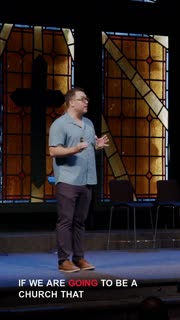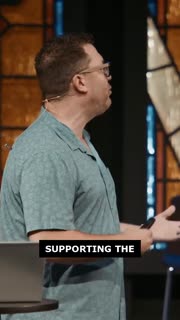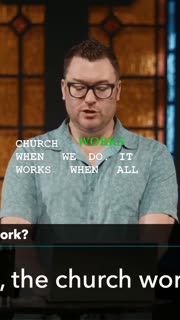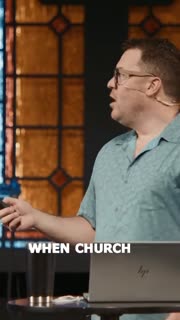Embracing Community: The Power of Baptism and Participation
Devotional
Sermon Summary
Bible Study Guide
Sermon Clips
1. "We don't go to church. We are the church. The church by definition is all Jesus followers everywhere. So there's a several hundred of us in here. We are, are just a microcosm of the church because there are Jesus followers all across the world. And all Jesus followers make up the church." [39:46] (21 seconds)
2. "If we are going to be a church that models Jesus Christ, this is a non-negotiable. So one of the things we can categorize a lot of the verses into is to love one another. Another one is to forgive one another. Ephesians 3, 4, 31 to 32. This actually gives us a couple, but the one I'm focusing on is forgive." [43:32] (15 seconds)
3. "We are expected to be involved in each other's lives and taking ownership for each other's well-beings. This goes all the way back to the beginning of our Bible, where Adam and Eve, Cain and Abel, right? Cain kills Abel. God comes to Cain and says, where's Abel? He goes, am I my brother's keeper? And God basically says, yes." [46:01] (16 seconds)
4. "Financially supporting the work of God and the workers of God was never a question of if, but maybe a question of how much. So that's something else that this whole church thing involves. Let's talk about the priesthood or the workers." [51:20] (16 seconds)
5. "If we start to summarize all this, the church was never meant to be a spectator sport. It was always meant to be a participation activity. It's also referred to as a body with Christ as the head. Every part is important. And just like every part of your body is involved, every member of the body of Christ should be involved. We need you. No part is unimportant." [54:04] (27 seconds)
6. "Church works when we do. It works when all believers take ownership and do their part, using their gifts and their resources to join God on his mission and fulfill the one another's prescribed in scripture. It works when we invest our finances to fund the work and the workers of God. It works when we use our gifts and resources to do our part." [01:07:43] (16 seconds)
7. "When church becomes a spectator sport, it becomes a cultural commodity to be examined and critiqued and judged and criticized. It becomes a cultural commodity to be examined rather than a caring community to be experienced. And I would add to shit and shared." [01:09:08] (16 seconds)
8. "Join us because the church is the best version of itself when all believers are investing their time, talents, and treasure to build up the body and advance the kingdom. Okay? So if you forget everything else I said, because I already asked you to forget everything you know about church. If you forget this sermon too, you can now tap into your memory again." [01:10:20] (18 seconds)
Ask a question about this sermon
2. "If we are going to be a church that models Jesus Christ, this is a non-negotiable. So one of the things we can categorize a lot of the verses into is to love one another. Another one is to forgive one another. Ephesians 3, 4, 31 to 32. This actually gives us a couple, but the one I'm focusing on is forgive." [43:32] (15 seconds)
3. "We are expected to be involved in each other's lives and taking ownership for each other's well-beings. This goes all the way back to the beginning of our Bible, where Adam and Eve, Cain and Abel, right? Cain kills Abel. God comes to Cain and says, where's Abel? He goes, am I my brother's keeper? And God basically says, yes." [46:01] (16 seconds)
4. "Financially supporting the work of God and the workers of God was never a question of if, but maybe a question of how much. So that's something else that this whole church thing involves. Let's talk about the priesthood or the workers." [51:20] (16 seconds)
5. "If we start to summarize all this, the church was never meant to be a spectator sport. It was always meant to be a participation activity. It's also referred to as a body with Christ as the head. Every part is important. And just like every part of your body is involved, every member of the body of Christ should be involved. We need you. No part is unimportant." [54:04] (27 seconds)
6. "Church works when we do. It works when all believers take ownership and do their part, using their gifts and their resources to join God on his mission and fulfill the one another's prescribed in scripture. It works when we invest our finances to fund the work and the workers of God. It works when we use our gifts and resources to do our part." [01:07:43] (16 seconds)
7. "When church becomes a spectator sport, it becomes a cultural commodity to be examined and critiqued and judged and criticized. It becomes a cultural commodity to be examined rather than a caring community to be experienced. And I would add to shit and shared." [01:09:08] (16 seconds)
8. "Join us because the church is the best version of itself when all believers are investing their time, talents, and treasure to build up the body and advance the kingdom. Okay? So if you forget everything else I said, because I already asked you to forget everything you know about church. If you forget this sermon too, you can now tap into your memory again." [01:10:20] (18 seconds)








